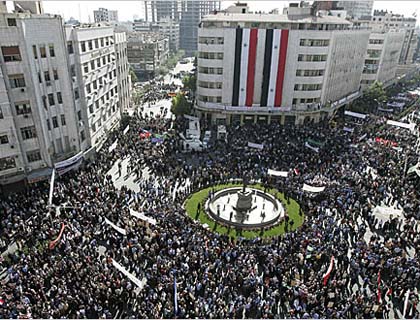Barak Obama has been reluctant to intervene in Syria's civil war, but reports of the alleged killings by the Assad’s regime by the use of chemical weapons near Damascus have put pressure on the White House to make good on the president's comment a year ago that chemical weapons would be a "red line" for the US. The Obama administration under new pressure to take more decisive steps in Syria following opposition renewed claims that Bashar al-Assad's government used chemical weapons to kill more than 1,000 people. But some analysts are not able to understand why would Assad want to use chemical weapons in the north-eastern suburbs of Damascus -- Damascus that's under his control -- to kill only, forgive me for being so cold, about 1,000 people, whereas on an average 5,000 people were killed every month for 16 months without chemical weapons? So why now when regime forces are gaining ground. Russia also said the rebels were impeding an inquiry and that Assad would have no interest in using poison gas for fear of foreign intervention this also seemed somewhat logical. But US is not prepared to buy any story which suggest that Syrian regime may not have used chemical weapons. America has already jumped to the conclusion that Assad has used chemical weapons even before the investigation of UN inspectors got completed.
In the meanwhile President Obama has asked the defence department to prepare options for all contingencies. US naval forces are moving closer to Syria for any possible air strikes against the Syrian military targets. But US is still in dilemma over whether it should directly interfere in Syrian conflict because America have many concern which are stopping it from direct military involvement in the conflict some of them are :-
- If the U.S. goes in and attacks another country without a U.N. mandate and without clear evidence that can be presented, and then there are questions in terms of whether international law supports it -- do we have the coalition to make it work?" Obama said. "Those are considerations that we have to take into account
- US President also cited the need for the U.S. to be part of a coalition in dealing with Syria. America's ability by itself to solve the Arab country's sectarian fighting is "overstated”.
- Russia and China have exercised its veto to block all efforts at the U.N. Security Council to condemn or put sanctions on the Assad regime, its closest ally in the Middle East. In addition to this Iran is also behaving militantly over any outside intervention in Syrian conflict which is making the situation more complicated. Iran's Foreign Ministry Spokesman Abbas Araqchi said a potential military offensive against Syria will entail dangerous and dire consequences, which will impact the whole Middle East.
- Setting up of No-Fly Zone would require hundreds of U.S. aircraft, which will cost as much as $1 billion a month and offer no assurance of changing the war's momentum.
- The US is also not sure whether Syria's rebels would support its interests if they seized power.
- Polls have consistently found that most people in the United States, tired from the costly and bloody fights in the Muslim world over the last decade, see little upside to U.S. involvement in a conflict that in some ways mirrors that of Iraq.
- Syrian opposition is full of extremist elements which can turn Syria into a radical state.
- Outside intervention can led to Syrian conflict to spill over to other countries like Jordan, Lebanon which will have a worse effect on Middle East stability.
But on other side US is also concern about its credibility as in August last year, Mr. Obama drew his “red line”, telling Assad regime that any use of toxic gas would “change my equation”. So, if US is convinced that red line has been crossed then it has to do something to keep its word. That’s why US naval forces are taking offensive position in the Mediterranean to bolster its image as the game changer. But any military involvement obviously would not resolve the crisis. It would just make it worse as always happens when the US military gets involved in parts of the world where it has no business being like –Iraq and Afghanistan where civil war is still going on. Moreover it will strengthen the argument that western powers want to re-colonize the Arab world as US is military involved at various places in Middle East.
International community is totally ignoring the other aspect of Syrian conflict which is inflicting very high human cost that is refugee crisis. There are more than 1.5 million Syrian refugees who’ve fled the country, into camps where conditions are really pathetic. They’re also worsening instability in neighboring Lebanon, Jordan and Iraq. They’re easier to reach than the suffering civilians within Syria, but there’s just not enough money. The United Nations announced in June that it needs $5 billion just to cover the most basic Syrian humanitarian needs until the end of the year. The United States announced in August that it would contribute an additional $195 million to humanitarian aid, a big step but far short of what’s needed.
Of course, it’s about more than just dollars. As various relief group supports for local governance within rebel-controlled areas of Syria, many of which have seen local institutions completely shattered, could go a long way to helping civilians. It might also make these areas more resilient against extremist influence. So what is required in Syria is peace and reconciliation process and not any military intervention which for sure will increase Syrian people suffering. All the Western nations which are showing concern for Syrian and advocating Military intervention should try to mediate between the regime and rebels rather than serving their vested interests.

